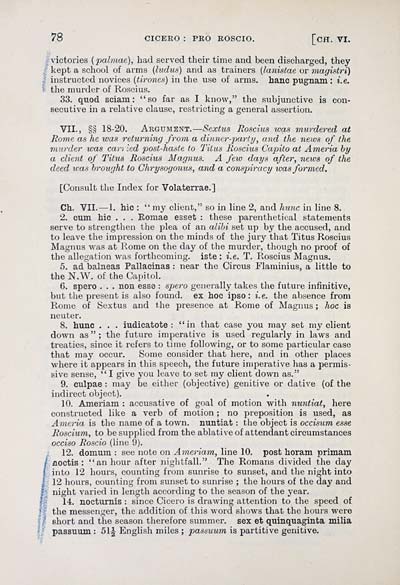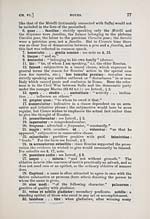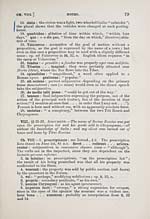Download files
Complete book:
Individual page:
Thumbnail gallery: Grid view | List view

78 CICERO : PRO ROSCIO. [CH. VI.
7 victories (palmae), liad served their tinie and been discharged, they
l kept a school of arms (ludus) and as trainers (lanistae or magistri)
I instructed novices (tirones) in the use of arnis. hanc pugnam : t.e.
' the murder of Roscius.
33. quod sciam: "so far as I know," the subjunctive is con-
secutive in a relative clause, restricting a general assertion.
VII., §§ 18-20. Argumsnt.— .Sexte Roscius was murdered at
Rome as he was returning from a dinner-parly, and the news of the
viurder was cavi ied post-haste to Titus Roscius Capito at Ameria by
a client of Titus Roscius Magnus. A few days after, uews of the
deed ^vas hrought to Chrysogonus, and a conspiracy wasformed.
[Consult the Index for Volaterrae.]
Ch. VII. — 1. hic : " my client," so in line 2, and hunc in line 8.
2. cum hic . . . Romae esset : these parenthetical statements
serve to strengthen the plea of an alihi set up by the accused, and
to leave the impression on the minds of the jury that Titus Roscius
Magnus was at Rome on the day of the murder, though no proof of
the allegation was forthcoming. iste : i.e. T. Roscius Magniis.
5. ad taalneas Pallacinas : near the Circus Flaminius, a little to
the N.W. of the Capitol.
6. spero . . . non esse : spero generally takes the future infinitive,
but the present is also found. ex hoc ipso : i.e. the absenee from
Rome of Sextus and the presence at Rome of Magnus ; hoc is
neuter.
8. hunc . . . iudicatote : "in that case you may set my client
down as " ; the future imperative is used regularly in laws and
treaties, since it refers to time following, or to some particular case
that may occur. Some consider that here, and in other places
where it appears in this speech, tlie future imperative has a permis-
sive sense, "I give you leave to set my client down as."
9. culpae : may be either (objective) genitive or dative (of the
indirect object).
10. Ameriam : accusative of goal of motion with nuntiat, here
constructed like a verb of motion ; no preposition is used, as
A^ne^j-ia is the name of a town. nuntiat : the object is occisum esse
Roscium, to be supplied f rom the ablati ve of attendant circumstances
occiso Roscio (line 9).
12. domum : see note on Ameriam, line 10. post horam primam
noctis : "anhour after nightfall." The Romans divided the day
into 12 hours, counting from sunrise to sunset, and tlie night into
12 hours, counting from sunset to sunrise ; the hours of the day and
night varied in length aceording to the season of the year.
14. nocturnis : since Cicero is drawing attention to the speed of
the messenger, the addition of this word shows that the huurs were
short and the season tlierefore summer. sex et quinquaginta milia
passuum : 511 English miles ; passuum is partitive genitive.
7 victories (palmae), liad served their tinie and been discharged, they
l kept a school of arms (ludus) and as trainers (lanistae or magistri)
I instructed novices (tirones) in the use of arnis. hanc pugnam : t.e.
' the murder of Roscius.
33. quod sciam: "so far as I know," the subjunctive is con-
secutive in a relative clause, restricting a general assertion.
VII., §§ 18-20. Argumsnt.— .Sexte Roscius was murdered at
Rome as he was returning from a dinner-parly, and the news of the
viurder was cavi ied post-haste to Titus Roscius Capito at Ameria by
a client of Titus Roscius Magnus. A few days after, uews of the
deed ^vas hrought to Chrysogonus, and a conspiracy wasformed.
[Consult the Index for Volaterrae.]
Ch. VII. — 1. hic : " my client," so in line 2, and hunc in line 8.
2. cum hic . . . Romae esset : these parenthetical statements
serve to strengthen the plea of an alihi set up by the accused, and
to leave the impression on the minds of the jury that Titus Roscius
Magnus was at Rome on the day of the murder, though no proof of
the allegation was forthcoming. iste : i.e. T. Roscius Magniis.
5. ad taalneas Pallacinas : near the Circus Flaminius, a little to
the N.W. of the Capitol.
6. spero . . . non esse : spero generally takes the future infinitive,
but the present is also found. ex hoc ipso : i.e. the absenee from
Rome of Sextus and the presence at Rome of Magnus ; hoc is
neuter.
8. hunc . . . iudicatote : "in that case you may set my client
down as " ; the future imperative is used regularly in laws and
treaties, since it refers to time following, or to some particular case
that may occur. Some consider that here, and in other places
where it appears in this speech, tlie future imperative has a permis-
sive sense, "I give you leave to set my client down as."
9. culpae : may be either (objective) genitive or dative (of the
indirect object).
10. Ameriam : accusative of goal of motion with nuntiat, here
constructed like a verb of motion ; no preposition is used, as
A^ne^j-ia is the name of a town. nuntiat : the object is occisum esse
Roscium, to be supplied f rom the ablati ve of attendant circumstances
occiso Roscio (line 9).
12. domum : see note on Ameriam, line 10. post horam primam
noctis : "anhour after nightfall." The Romans divided the day
into 12 hours, counting from sunrise to sunset, and tlie night into
12 hours, counting from sunset to sunrise ; the hours of the day and
night varied in length aceording to the season of the year.
14. nocturnis : since Cicero is drawing attention to the speed of
the messenger, the addition of this word shows that the huurs were
short and the season tlierefore summer. sex et quinquaginta milia
passuum : 511 English miles ; passuum is partitive genitive.
Set display mode to: Large image | Transcription
Images and transcriptions on this page, including medium image downloads, may be used under the Creative Commons Attribution 4.0 International Licence unless otherwise stated. ![]()
| Early Gaelic Book Collections > Matheson Collection > Pro S. Roscio Amerino > (86) |
|---|
| Permanent URL | https://digital.nls.uk/76503278 |
|---|
| Description | Items from a collection of 170 volumes relating to Gaelic matters. Mainly philological works in the Celtic and some non-Celtic languages. Some books extensively annotated by Angus Matheson, the first Professor of Celtic at Glasgow University. |
|---|
| Description | Selected items from five 'Special and Named Printed Collections'. Includes books in Gaelic and other Celtic languages, works about the Gaels, their languages, literature, culture and history. |
|---|

